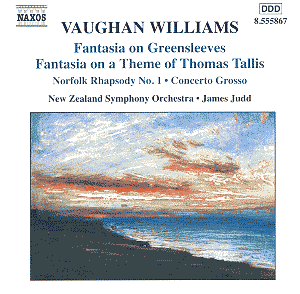This disc provides an opportunity for comparisons
between the ‘pastoral’ music for which Vaughan Williams is famous
and his more penetrating scores. He drew freely on folk songs,
but in his orchestral music they become part of a more adventurous
harmonic and melodic fabric that takes the listener well beyond
bucolic ‘scene painting’ and become part of a more intense musical
experience. Like his contemporary Elgar, he loved a good tune,
yet VW was intensely self-critical and rarely left it at that.
The Tallis Fantasia is subtle and complex, the Tallis theme being
only the starting point for a series of transformations through
which it passes in these moving variations; and, yes, there is
a folk song nestling within them. Conversely the Greensleeves
Fantasia preserves the simple charm of the original tune throughout.
VW was constantly revising his own music and it is interesting
to note that, though seemingly spontaneous, In the Fen Country
– written in 1904 and given its first performance under Beecham
in 1909 – was constantly being changed right up to its
final publication in 1949.
The improvisatory Norfolk Rhapsody makes
use of three folk songs, The Captain’s Apprentice, A
Bold Young Sailor and On Board a Ninety-Eight. It was
the first of three such works, although the other two were later
withdrawn. The folk songs are framed by lightly sketched impressions
of the Norfolk landscape and feature telling passages for solo
viola, cor anglais, bassoons and cellos. The Concerto Grosso,
written for the 21st Anniversary of the Rural Music
Schools Association, is yet another demonstration of VW’s restless
versatility. On that occasion it was played by some 400 young
string players in three categories of technical skill. Its baroque
structure disguises a wickedly witty romp with a rousing march
and a Burlesca Ostinata that starts entirely on open strings.
VW was an active supporter of music for young people, as this
example shows.
The orchestra takes most of this in its stride,
though I would have liked a slower pace and a more lyrical sound
in the Tallis Variations. The playing is accomplished, but decidedly
‘cool’ with a curious lack of response to what might be called
the ‘inward landscape’ of these works. They are all quintessentially
English in subtle ways that, perhaps, may not be so clearly focused
in New Zealand. This could seem a capricious criticism unless
comparisons are made with Beecham, Boult and other specialists
in the music of Vaughan Williams. Nevertheless, it would be unlikely
that all of them could be found on a single CD, especially at
bargain price, and should stimulate interest in a voice that was
both individual and influential in the new generation of 20th
century British composers.
Roy Brewer
